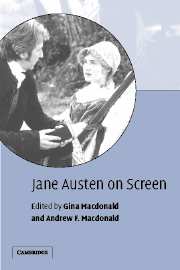Book contents
- Frontmatter
- Contents
- List of illustrations
- List of contributors
- Acknowledgments
- Introduction
- 1 Short “Takes” on Austen: summarizing the controversy between literary purists and film enthusiasts
- 2 Janeite culture: what does the name “Jane Austen” authorize?
- 3 “Such a transformation!”: translation, imitation, and intertextuality in Jane Austen on screen
- 4 Two Mansfield Parks: purist and postmodern
- 5 Sense and Sensibility in a postfeminist world: sisterhood is still powerful
- 6 Regency romance shadowing in the visual motifs of Roger Michell's Persuasion
- 7 Filming romance: Persuasion
- 8 Emma, interrupted: speaking Jane Austen in fiction and film
- 9 Reimagining Jane Austen: the 1940 and 1995 film versions of Pride and Prejudice
- 10 Emma and the art of adaptation
- 11 Clues for the clueless
- Questions for discussion
- Filmography
- Bibliography
- Index
7 - Filming romance: Persuasion
Published online by Cambridge University Press: 05 June 2012
- Frontmatter
- Contents
- List of illustrations
- List of contributors
- Acknowledgments
- Introduction
- 1 Short “Takes” on Austen: summarizing the controversy between literary purists and film enthusiasts
- 2 Janeite culture: what does the name “Jane Austen” authorize?
- 3 “Such a transformation!”: translation, imitation, and intertextuality in Jane Austen on screen
- 4 Two Mansfield Parks: purist and postmodern
- 5 Sense and Sensibility in a postfeminist world: sisterhood is still powerful
- 6 Regency romance shadowing in the visual motifs of Roger Michell's Persuasion
- 7 Filming romance: Persuasion
- 8 Emma, interrupted: speaking Jane Austen in fiction and film
- 9 Reimagining Jane Austen: the 1940 and 1995 film versions of Pride and Prejudice
- 10 Emma and the art of adaptation
- 11 Clues for the clueless
- Questions for discussion
- Filmography
- Bibliography
- Index
Summary
Early in John Schlesinger's film version of Stella Gibbons's Cold Comfort Farm (1994), the heroine declares that when she is fifty-three, she means to write a novel “as good as Persuasion”; after all, says Flora Poste (Kate Beckinsale), she and Jane Austen have much in common: neither can “endure a mess.” This is a richly intertextual moment, for not only does Flora Poste go on to enact the interventionist practices of Emma (rather than Anne Elliot's tendency to “listen patiently, soften every grievance” [46]), but Beckinsale goes on to play Emma in the Diarmuid Lawrence film (1996).
Moreover, much of the comedy in the film derives from Flora's appalling attempts at novelistic prose, which imitate and torture the writing of D. H. Lawrence (“From the stubborn interwoven strata of his subconscious …”). Flora Poste, we realize, can never approach her dream of writing like Jane Austen, but she manages quite well as a character who could have been written by Austen. This complex set of effects is available, of course, only to a certain kind of spectator, one who is familiar with Austen's novels and who also frequents “high-culture” popularizations of British novels. The pleasures of intertextual readings are, however, complicated by an inevitable sense of disappointment, as no interpretation can exactly match the reader's own imagined version of Austen's text.
- Type
- Chapter
- Information
- Jane Austen on Screen , pp. 127 - 143Publisher: Cambridge University PressPrint publication year: 2003
- 2
- Cited by



